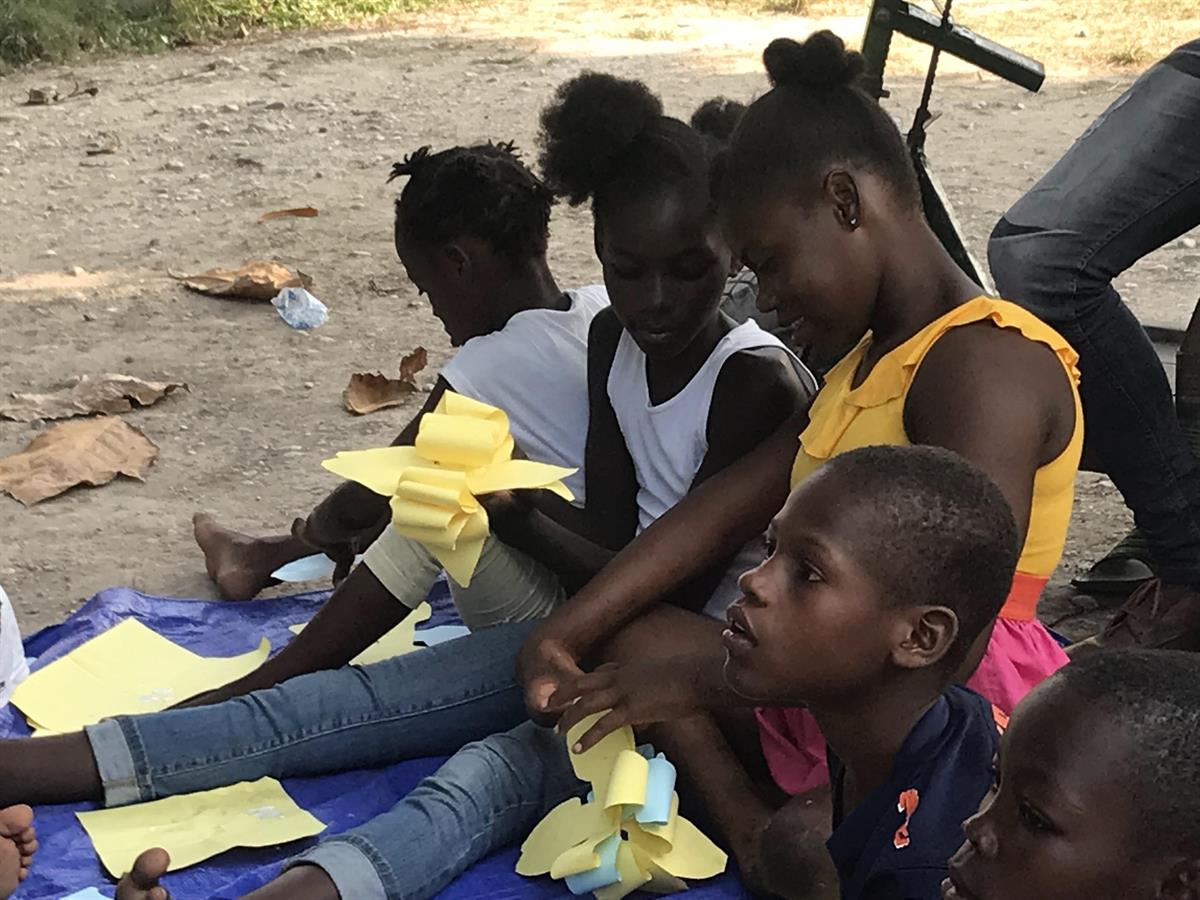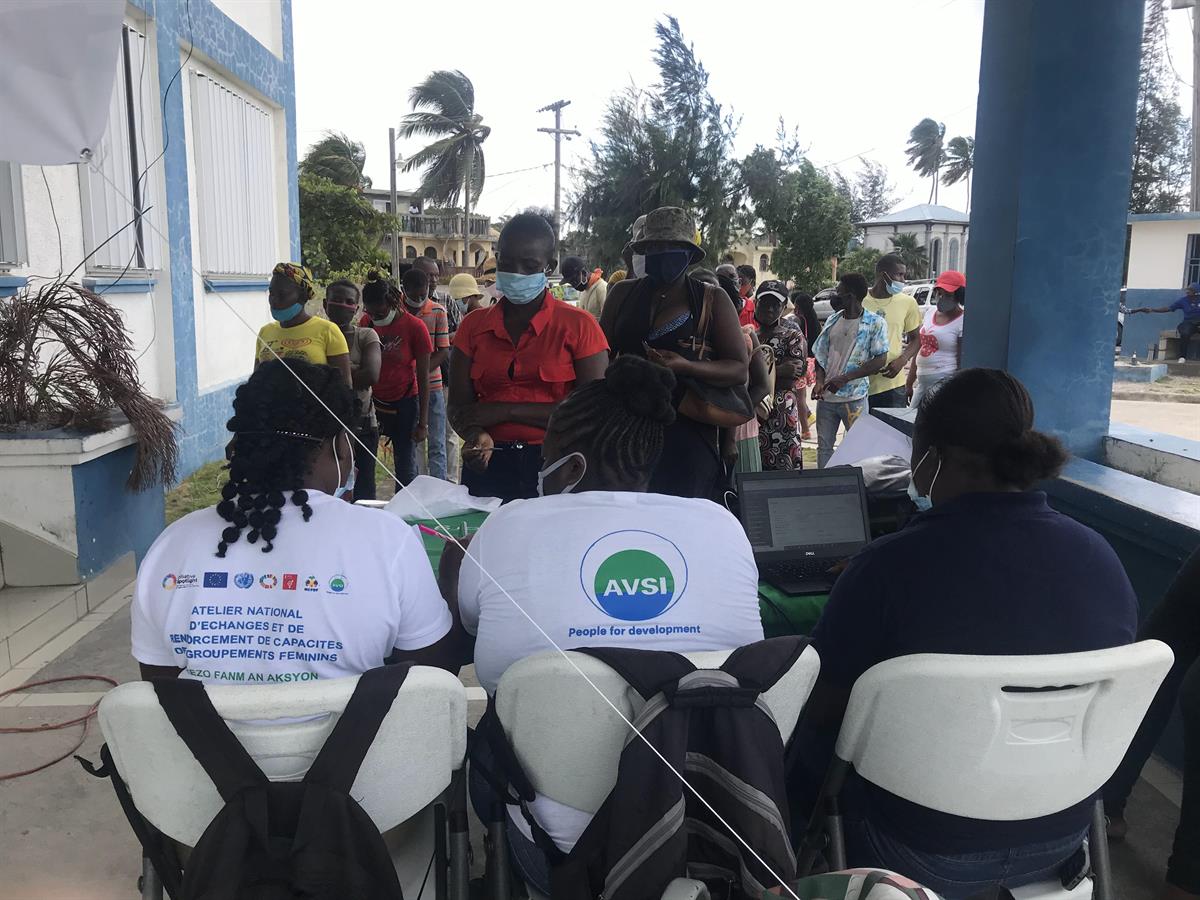April 2022
Even as NGOs and public authorities flee from Port au Prince’s most vulnerable neighborhoods, AVSI has chosen to stay – accepting the grave risks of standing with the Haitian people, including many of our colleagues and friends. AVSI urgently calls on others to stand with us.
The consequences of desertion would be far too great, for Haiti and the region. In fact, if donors and NGOs continue to pull out of Haiti, the results are unfortunately very predictable: migration of the most capable, causing painful family breakups, weakening of the economy for those who remain, increased violence and the indiscriminate loss of life.
All of which creates a readymade vacuum for corruption and organized gang infiltration.
Earlier this month, the White House issued a policy statement which seeks to interrupt pathways to conflict for fragile states, recognizing Haiti as a country integral to regional peace and stability.
As we applaud the U.S. Administration's efforts to provide a roadmap to stability for Haiti, through renewed commitment to the Global Fragility Act, AVSI issues this urgent Call to Action, wherein we present: 1) The current context in brief; 2) Observations of donor trends; 3) AVSI’s Recommendations for urgent action; and 4) AVSI’s capacity and track record.
Context
Conditions in Haiti have gone from bad to worse. The political instability has only emboldened armed gangs who hold the county and its resources hostage. Food insecurity is reported at 60%.
Recently, in Cite Soleil, an infamous slum of Port au Prince, our staff reported 10 kidnappings in a single day, not to mention the shocking daily death toll and other violent crimes which plague the capital city.
The closure of important services like the Médecins Sans Frontières (MSF) hospital in Martissant, and the near complete withdrawal of police from the gang-controlled areas of the capital signal that local communities are being abandoned to themselves. Even Prime Minister Ariel Henry’s movements are closely monitored and often dictated by gangs.
Faced with such a situation, it is understandable that donors and NGOs have decided to pause operations, invest energies and resources elsewhere, or at least relocate to other regions of Haiti where there is relatively more stability.
Port au Prince is not only the capital of the country, but the epicenter of governance, politics, transportation and the economy. Gang control over sections of the city has repercussions for the entire country, as the disruption of the humanitarian response to the earthquake in August 2021 and the fuel crisis made abundantly clear.
Retreating from Port au Prince and forfeiting humanitarian access to the most dangerous neighborhoods would mean losing any foothold within communities which have outsized influence on the course of the country. Doing so cedes power to the ruthless gangs. The population would continue to be terrorized by the random violence of kidnappings and extortion which cripples human, economic and social development, and would continue to migrate en masse to other countries, including to the United States.

AVSI’s observations
During a series of meetings AVSI held with donor agencies in Washington, DC and New York, NY, in February 2022, the following challenges to staying engaged in Haiti were expressed.
- The scale of the problem is immense. Donors can feel disoriented about where to start and how to go beyond providing emergency relief.
- The situation in Port au Prince is so daunting that donors are opting to focus efforts elsewhere. The extremely limited humanitarian access in neighborhoods of the capital, like Cite Soleil and Martissant, reduces the room for constructive action.
- Weaknesses of government counterparts necessitate reliance on civil society which is under immense pressure due to gang influence, generalized violence and instability.
- Sector specific budget lines and earmarks constrain donors and prevent responses that match the complexity of the situation and need for interconnection across sectors.
- Pressure to show results makes operating in Haiti very risky, especially in Port au Prince.
AVSI’s recommendations for action
- Fight to maintain humanitarian access in the capital, Port au Prince and recognize that sufficient support is needed to save lives and keep peace before any intention to see long-term results. Donors and NGOs cannot continue to abandon the most dangerous neighborhoods of Port-au-Prince because the repercussions on the entire country are too great.
- Focus on the micro, community level, with a strategic lens. Look for and invest in shortterm, high-impact and multi-sectoral projects in specific communities, including in Port au Prince. This is the time to think and work in an integrated manner, focused on a community with high intensity, targeted efforts that can disrupt the downward cycle now being seen.
- Rely on partners who know the communities, have painstakingly built trust, yet also maintain neutrality and can navigate the situation and mitigate the risk of manipulation by gangs and warlords. Conducting due diligence on partners in this context is extremely difficult, yet one simple test can tell an external actor a lot: the ability to access, safely and regularly, hazardous areas and deliver services to a meaningful percentage of the population without undue interference is a testament to the access gained by such organizations and their legitimacy with the population.

AVSI’s organizational capacity and track record
For over 16 years, AVSI has been an active partner with the communities in Cité Soleil and Martissant, with community-based interventions addressing long-term development needs and responding to emergencies. In 2020, AVSI was invited to expand work in the areas of Bel Air and La Saline.
AVSI’s methodology saves lives, improves health and well-being, and increases the chances for vulnerable youth to become healthy and productive adults in the most violence-prone neighborhoods.
The central aspects of AVSI’s methodology are:
WHERE: Place-based community-development approach anchored on educational centers that are community-owned and provide safe spaces for youth, access to services, protection, and psychosocial support: “Le Soleil de la Cite,” in Cite Soleil, and “Jardin l’espwa,” in Martissant. Broad outreach to the community allows for the integration of youth associated with gangs and mitigates the risk of manipulation by gang leaders.
WHO: Staff come from the community and include former gang members who are well trained and provide positive role models for children and youth.
WHAT: Responsive programming that meets immediate needs while investing in skills, relationships and resilience capacities to serve long-term objectives:
- As needed, cash or voucher interventions address food insecurity at a large scale, through partnership with funders such as the InterAmerican Development Bank (IADB).
- Acute malnutrition attention, care, and referrals for services with targeted focus on infants, children and women.
- Positive youth development strategies, which include vocational training and youth empowerment strategies, in collaboration with local institutions as well as soft skills training (conflict resolution, emotional intelligence, and time management). These activities prevent recruitment into gangs, support reintegration, and build the resilience capacities of youth and young adults in a critical phase of their lives.
- Trauma-informed psychosocial support through a range of activities and services that can include group and individual counseling, art therapy and safe recreational opportunities.
Conclusion
Retreat from the challenging environment in Port au Prince is a short-sighted solution that will only exacerbate the problem, with potentially severe consequences for the Haitian people and the region.
AVSI is a strategic partner that 1) keeps open humanitarian access to the most hazardous neighborhoods; 2) focuses on place-based strategies with a high degree of community-buy in and support, employing local staff; and 3) brings proven, context-specific strategies that integrate across sectors for holistic care and greater impact. AVSI is ready to work with donor agencies and partners to expand and strengthen this programmatic approach.
For more information or to discuss these recommendations, contact us: [email protected]